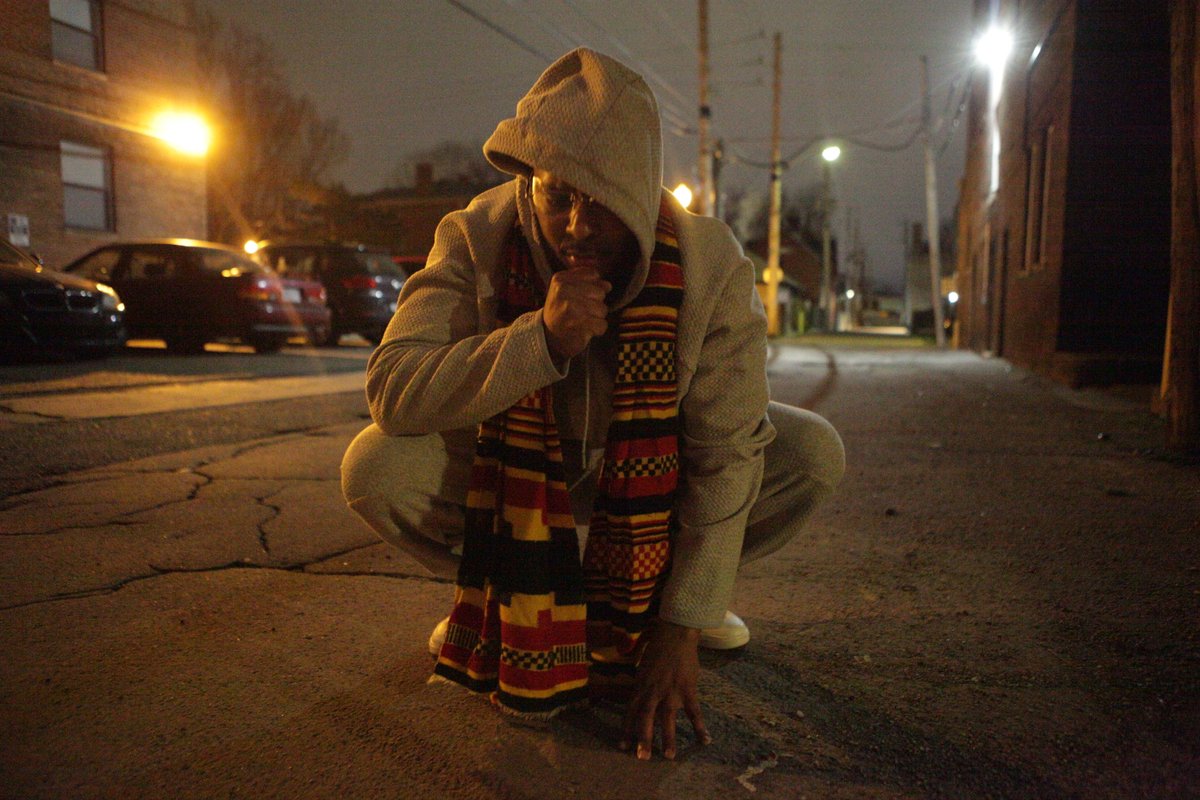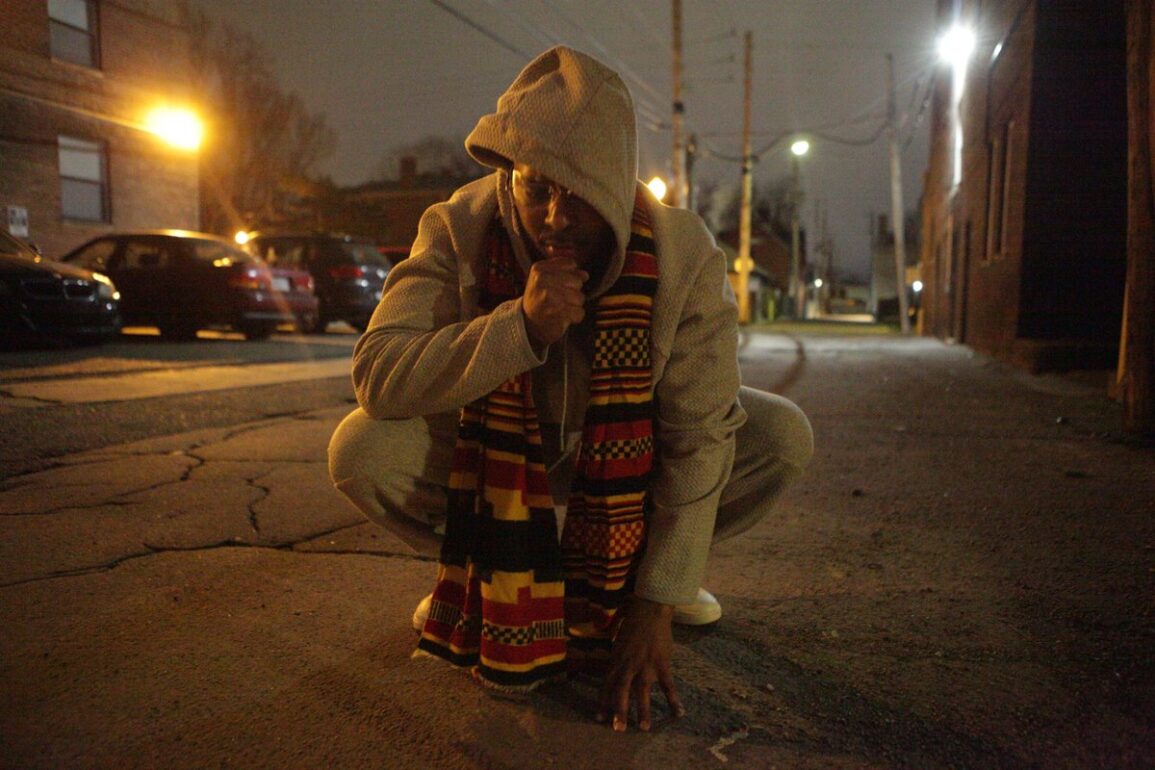
“INNOCENT,” by EL BENTLY 448 begins with conversational spoken word, accented by visceral and cinematic horns. “Truth never dies, huh? Hey, let me ask you something: Why everybody in prison say they innocent? Let me guess, you innocent too, huh?”
The beat comes in and EL BENTLY 448 begins telling his story.
“For the shooting murder of Kasey Schoen, told y’all I was innocent. / Jury didn’t judge the evidence, they judged me on my blemishes,” he raps. The chorus continues, “I told y’all I was innocent, but nobody believed in it./Got no help, no love and affections when I really needed it/Screamed my declarations everyday, no one was listening/Stabbed by the spear of destiny, but nobody was feeling it.”
EL BENTLY 448 is the stage moniker of Leon Benson, a man who was recently exonerated after spending twenty-five years in an Indiana prison for a crime he did not commit. “INNOCENT” is one of seven songs off of his debut EP, INNOCENT BORN GUILTY released on June 26 by Die Jim Crow, the first nonprofit record label in the United States serving presently and formerly incarcerated musicians. Die Jim Crow provided Benson with the platform to tell his story and indict the justice system.
On August 8, 1998, twenty-five-year-old Kasey Schoen was fatally shot in Indianapolis, Indiana, while stopped in his truck. A search of the crime scene and questioning of Shoen’s family and friends did not lead to any immediate evidence pointing toward a suspect. Eventually, the case had a breakthrough when a woman who was delivering newspapers on the night of the murder claimed she saw a dark-skinned individual take out a gun and shoot Schoen. She picked Benson out of a photographic lineup, and he became the prime suspect.
Benson’s first trial ended in a mistrial. His 1999 retrial led to his conviction and a sentence of sixty-one years in prison. The retrial relied on the witness’ vague description and excluded crucial evidence that ruled Benson out. One eyewitness identified another man named Joseph Webster as the perpetrator; another said he was with Benson at a nearby apartment during the time of the murder. In the weeks leading up to the killing, police had stopped Webster in the same neighborhood Shoen was killed. In his possession was the same type of handgun that was used in the murder.
Benson did not know the perpetrator or the victim, but he served twenty-five years in prison—ten of which were spent in solitary confinement.
“Truth never dies; it’s only rediscovered” became Benson’s motto. It ultimately became a reality. Led by attorney and author Lara Bazelon, the Racial Justice Clinic at the University of San Francisco took on and won Benson’s case. On March 9, 2023, Benson walked out of the Correctional Industrial Facility in Pendleton, Indiana, finally free.
“It’s a spiritual journey,” Benson told me. “You are confronted with a lot of trauma, a lot of loss, a lot of hurt. Just being wrongfully incarcerated is like a social death. You become what Ralph Ellison wrote about many years ago in his great novel Invisible Man. I was very invisible. I was dead to society.”
Benson remembers the grief he experienced throughout his sentence, experiencing the stages of denial, anger, bargaining, and depression before coming to an acceptance. “I had to accept the circumstances,” he said. “I’m like, ‘I’m here until this process is over, so I have to be the best version of myself in this situation,’ and that took a lot of time to do.”
Benson spent ten years in solitary confinement. He describes turning his isolation cell into a university, studying the work of activists, artists, scholars, and philosophers, from Malcolm X and Elijah Muhammed to Carl Jung and Friedrich Nietzsche. In 2012, while serving in solitary confinement for possessing a cell phone, he wrote the song “INNOCENT.”
In addition to his own experience, Benson drew on the diverse bodies of work he had studied, alongside contemporary music and movies. He says he has always been an artist, recounting teachers at the daycare he attended encouraging his clay sculptures and storytelling. As he got older, music also became a passion of his.
In 2014, through a fellow activist in New York, Benson met Fury Young, founder of the Brooklyn-based nonprofit Die Jim Crow. At the time, the label was working to record the music of prison-impacted musicians and release it on a collective album of the same name, inspired by Michelle Alexander’s movement-shaping book, The New Jim Crow: Mass Incarceration in the Age of Colorblindness.
“We got different backgrounds, but we had similar visions that we wanted for America through the mass incarceration epidemic,” Benson says. “I learned that Fury read Michelle Alexander and had really seen the caste system in America for what it was, and he wanted to do something about it, and he is doing his part to do it.”
Young, in an interview, recalls that he immediately recognized Benson’s uniqueness as an artist and person. “Instantly, I was like, ‘This guy is someone special,’” he adds. “He was quoting all types of obscure philosophy, and I was just really into how he was kind of a heady person, intellectual. He was talking about, like, Sartre and Camus, and I thought that was really interesting because, in the next sentence, he’d talk about Tupac and Kendrick Lamar.”
The two became pen pals, sharing lyrics and ideas. Benson displayed his visual art at a Die Jim Crow art show, and almost all of his pieces sold. But when Die Jim Crow tried to gain access to the prison to record Benson, they were denied several times.
In 2016, Benson obtained another contraband cell phone and set to work, secretly recording his vocals through an earplug-microphone, temporarily using beats to popular songs and sending them to Young. Benson risked guards finding out, other inmates snitching, and more potential time in solitary confinement if he would be caught. “What happened with the music and the art was I was using it as tools to campaign or be heard,” Benson says. In an essay for Die Jim Crow, Benson calls the album his “audio kite”—his message to the outside world.
Benson could not approve the EP in full until he was released from prison in 2023, because the only way Young was allowed to share songs with him was through fifteen-second long video files.
“It was so tedious and ridiculous,” Young says. “Like, imagine exporting a song every fifteen seconds, with just, like a black background so it’s a video file. This is how prison shit works. It’s all just roundabout bullshit.”
Young connected Benson with producer Trvp Lvne, who had worked on other Die Jim Crow projects, to create original beats for the songs. The process was tedious. Aside from Benson having to record clandestinely, the Die Jim Crow team also experienced technical hiccups and loss of files while painstakingly navigating prison rules and bureaucracy.
During this time, Die Jim Crow was able to raise enough money to become a full-fledged record label, and be able to manage the recording, production, and promotion of its artists’ work.
Benson says his message is that of empathy and humanity. “Some of the things that you hear on my new album INNOCENT BORN GUILTY—It’s bigger than Leon Benson, it’s bigger than hip hop,” he notes. “This is a human story. Innocent born guilty. I want you to sit in my shoes because I sat in the shoes of society. I thought about society more than they thought about me . . . Everybody in the world is innocent, born guilty. We never asked to come here, but we are made guilty by the standards of somebody else’s politic.”
The track “INNOCENT” grapples with the nuances of being imperfect in a system that seeks to criminalize and label people in Benson’s position. He grew up in Flint, Michigan, and dealt and used drugs when he was young. As he raps, “I’ve done a lot of dumb shit / But for this murder, I’m not to blame.”
The song “MURDERDAWORLD” expresses Benson’s rage at the injustice he, and others like him, face. He says performing the song today feels cathartic. “That rage I’m talking about, I no longer feel it. I can display it from time to time, but in my overall life, I’ve moved on,” he explains.
Benson’s artistic approach may be unique, but his experience of being wrongfully convicted is not. Almost two million people are incarcerated in the United States, making up 22 percent of the world’s incarcerated population. According to the Georgia Innocence Project, 4 to 6 percent of incarcerated people are actually innocent. The University of Michigan’s national survey on exonerations found that Black Americans are more than seven times more likely than white Americans to be wrongfully convicted of a serious offense.
“I think to have someone who did all that time and can speak to that experience but also is an extremely talented artist and willing and eager to connect with the public on an artist level and an activist level . . . I think that that’s a really unique thing,” Young says. “And he’s not broken, he’s super smart, and he’s able to speak for a lot of people because, unfortunately, it’s not a unique experience.”
Benson’s story has gained some notoriety. The popular true-crime podcast Suspect just premiered its third season, which focuses entirely on Benson’s case. Benson said that he hopes hearing this record and learning the story behind it will inspire others to challenge the thoughts and ideas that fuel mass incarceration and systemic injustice.
“On one hand, I am a survivor of the atrocity of injustice,” he said. “I’m a thriver as well. I’m a curator of my soul, of my ideas. I [went to prison], and I was stripped away of a lot of things. I lost time with my children. I lost my twenties, thirties, most of my forties. A great loss all around the board.”
“I lost my hair,” he said, laughing. “But one thing I didn’t lose, though—I didn’t lose my integrity, I didn’t lose my vision. I went in as a kid who loved hip hop, and I came out as a kid who loved hip hop. And I still got my microphone.”
This post was originally published on this site be sure to check out more of their content.







